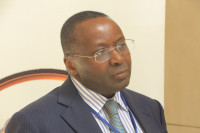Economics & Global Development
Macroeconomics
AXA Chairs
Spain
2009.07.31
Chair AXA - BSE on Macroeconomic Risk
When great expectations meet financial uncertainty
His recent work on expectations holds meaning for workers, investors, and policy. Much of the existing literature on inflation has been limited by its assumption of “rational” expectations—assuming that investors perfectly understand whether a shock will have temporary or permanent impacts. However, we are not yet able to predict the future with such precision. This means that decisions on how to deal with inflation are influenced by expectations and with far-reaching effects. For example, investors who expect inflation to increase might move their savings to the US to secure a higher return, which could, in turn, cause the dollar to increase in value. In related work, Professor Marcet has found that investors’ expectations about stock prices are a key determinant of stock price volatility.
Professor Marcet’s work has additional implications for policy, which is also guided by expectation. For example, if inflation is expected to remain high or increase further, interest rates should be adjusted upwards; if not, then interest rate adjustments (and their negative effects on output) should generally be avoided. Given this, he suggests that central banks closely monitor these kinds of expectations. His work could supplement existing models used to understand the economy and could help central banks to understand when, how, and by how much to change the interest rates.
Professor Marcet has also produced compelling findings in fiscal policy. His recent work challenges the claim that decreasing capital taxes is good for everybody in that it promotes investment, which increases the productivity of firms, which in turn increases workers’ wages. Instead, Professor Marcet’s results indicate that a reduction in capital tax would bring more benefits to those with a higher total income and would harm large sectors of the population with low capital income unless labor taxes are also lowered.
Another aim for Professor Marcet is to make the topic of macroeconomic risk accessible to a wider audience. Taking inspiration from his time at the London School of Economics, where public events are regularly on the agenda, he has planned a series of conferences; the AXA-BSE Talks on the Economy. In these events, designed for a wide audience, policymakers, economics researchers, and business leaders will discuss various policy issues relating to macroeconomic risk. The first AXA-BSE Talk is set for June 20th, 2022. Among the guest speakers is James Bullard, president, and CEO of the Federal Reserve Bank of St. Louis and a long-standing member of the Federal Open Market Committee. Discussions will be facilitated by commentators: Gilles Moec, AXA Group Chief Economist, and Chiara Osbat, Economics Adviser at the European Central Bank. The conference proceedings will be interpreted from English into Spanish and/or Catalan.
Updated on June 2022

Albert
MARCET
Institution
Barcelona School of Economics
Country
Spain
Nationality
French
Related articles
Economics & Global Development
Climate Change
Finance, Investment & Risk Management
Insurance & Risk Management
Sustainable Finance
Climate Adaptation & Resilience
Greenhouse Gases Emissions
AXA Project
Driving Innovation in Economic Policy Partnership Extension
In 2024, the AXA Research Fund and the Centre for Economic Policy Research (CEPR) renewed their strategic partnership aimed at... Read more
Centre for Economic Policy Research
(CEPR)
Centre for Economic Policy Research
Economics & Global Development
Finance, Investment & Risk Management
Insurance & Risk Management
Sustainable Finance
Economic Loss & Disaster Risk Financing
Political Economy & Governance
AXA Project
Driving Innovation in Economic Policy
In October 2021, the AXA Research Fund and the Centre for Economic Policy Research (CEPR) embarked on a three-year strategic... Read more
Centre for Economic Policy Research
(CEPR)

